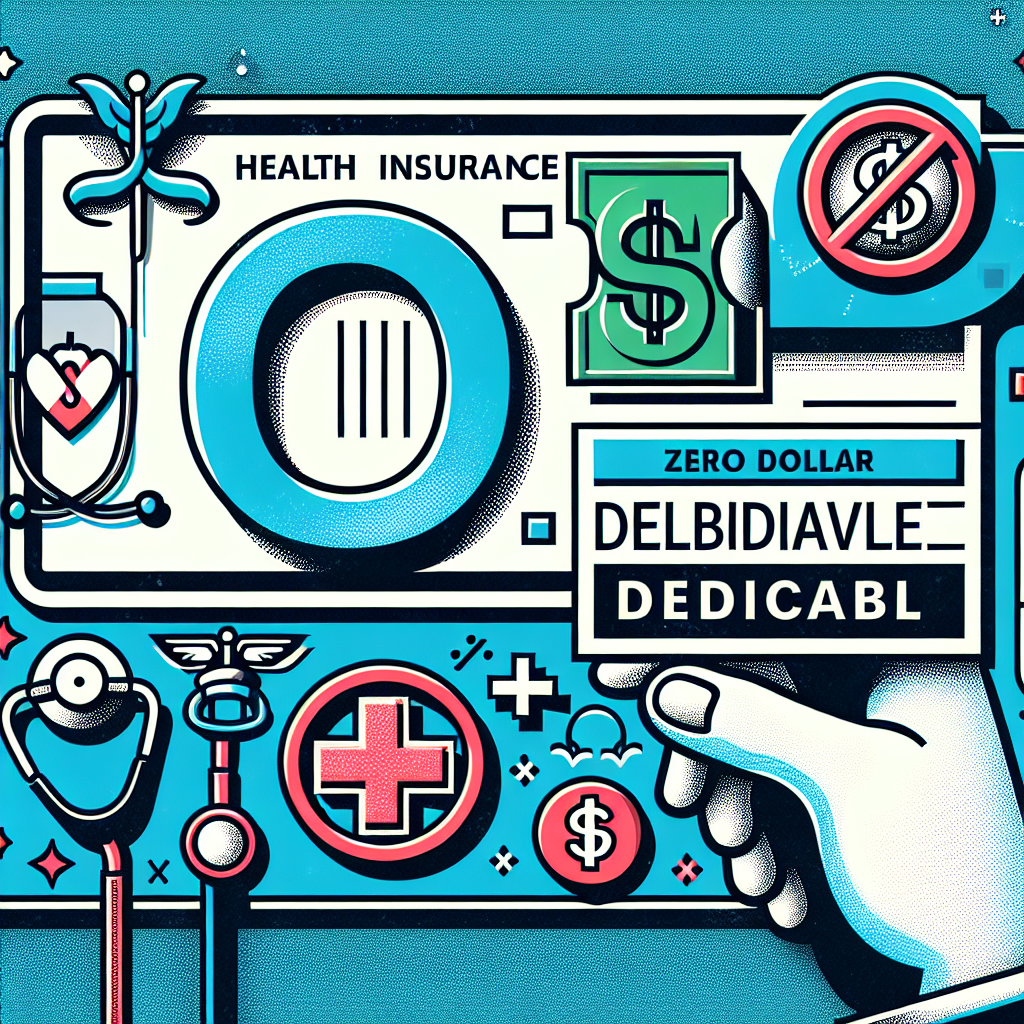Filed under Health Insurance on
Understanding Zero Dollar Deductible Health Insurance

Health insurance can often be a complex topic to navigate, especially when trying to understand the intricacies of different deductible options. Zero dollar deductible health insurance plans, though gaining popularity, remain somewhat of a mystery to many. This article aims to demystify zero dollar deductible health insurance, providing clear insights and helpful information to guide your decisions.
What is Zero Dollar Deductible Health Insurance?
Zero dollar deductible health insurance refers to policies that do not require the insured to pay any upfront costs before the insurance coverage begins to pay for medical expenses. In other words, as soon as you start using your covered health services, your insurance kicks in immediately without the need to meet a deductible threshold. This feature can be particularly advantageous for those who anticipate needing frequent medical attention.
How Do Zero Dollar Deductible Plans Work?
Under typical health insurance plans, policyholders are often required to pay a set amount, known as a deductible, before their insurance covers further costs. However, with zero dollar deductible plans, you bypass this initial cost hurdle. As soon as you require healthcare services covered under your plan, such as doctor visits, prescription medications, or hospital stays, your insurer covers these costs subject to policy terms.
Benefits of Zero Dollar Deductible Plans
- Immediate Coverage: You begin to receive benefits immediately without having to pay an initial sum out of pocket.
- Budget-Friendly for Frequent Health Needs: Ideal for individuals or families expecting regular visits to healthcare providers, ensuring they don't face unexpected costs.
- Predictable Costs: Since there is no need to pay a deductible, your annual healthcare expenses become more predictable, aiding in financial planning.
Considerations to Keep in Mind
- Premium Costs: Zero dollar deductible plans may come with higher monthly premiums, which can affect your budget.
- Network Limitations: Some plans may limit the choice of healthcare providers, so it’s essential to verify if your preferred doctors are included.
- Plan Restrictions: Certain services might still have copayments, so understanding plan details is crucial.
Why Consider Zero Dollar Deductible Health Insurance?
Zero dollar deductible health insurance plans are not for everyone. They cater particularly well to specific groups of people:
- Frequent Healthcare Users: Those who need regular medical services will benefit tremendously from this structure, avoiding repeated out-of-pocket expenses.
- Families with Young Children: Children often require regular medical attention, from routine checkups to treatments, making zero dollar deductible plans financially smarter for families.
- Individuals with Chronic Conditions: Chronic conditions require ongoing treatment; a zero deductible means these individuals won't be burdened by costs at each doctor's visit.
Industry Trends and Expert Opinions
According to industry trends, there has been a shift towards more consumer-friendly health plans, with increased demand for zero dollar deductible options. Health economist Dr. Jane Thompson suggests these plans are responding to an overarching need for more predictable healthcare expenses as the economic landscape continues to fluctuate. With economic uncertainty, knowing your healthcare costs can be anticipated is invaluable.
Moreover, insurance experts often advise balancing higher premiums with the peace of mind knowing there's an absence of up-front medical costs. As per John Doe, a renowned insurance analyst, "The initial outlay on premiums is often justified by the elimination of expense unpredictability associated with high deductibles."
Comparing Zero Dollar Deductible Plans with High Deductible Options
Understanding the distinctions between zero dollar deductible health insurance and high deductible plans is crucial for making the right choice. Here's a quick comparison:
High Deductible Health Plans (HDHPs)
- Lower Premiums: Typically offers lower monthly payments.
- Higher Out-of-Pocket Costs: These plans require a larger deductible to be met before significant insurance coverage kicks in.
- Compatibility with Health Savings Accounts (HSAs): Often paired with HSAs which can offer tax benefits.
Zero Dollar Deductible Plans
- Higher Premiums: Expect to pay more on a monthly basis for immediate coverage.
- Immediate Benefits: Insurance covers healthcare expenses from the outset, as previously discussed.
- Cost Predictability: Financial predictability with no large deductible expenditure.
Things to Consider When Choosing Your Plan
- Evaluate Your Health Needs: Assess your and your family’s medical history to decide if frequent visits make a zero dollar deductible plan worthwhile.
- Review Financial Flexibility: Determine if higher monthly premiums fit within your budget comfortably.
- Provider Accessibility: Confirm that your preferred healthcare providers are within the plan’s network.
- Future Planning: Consider potential life changes such as new family members or career shifts that might affect your healthcare needs.
Conclusion
In conclusion, understanding zero dollar deductible health insurance is key to making informed decisions about your healthcare plan selections. While these plans offer immediate benefits and predictability, their suitability highly depends on your personal circumstances. By considering your health needs, evaluating your budget, and understanding coverage details, you can more effectively determine if a zero dollar deductible health insurance plan aligns with your financial and health objectives. In the evolving landscape of health insurance, being informed equips you to choose wisely for yourself and your loved ones.





